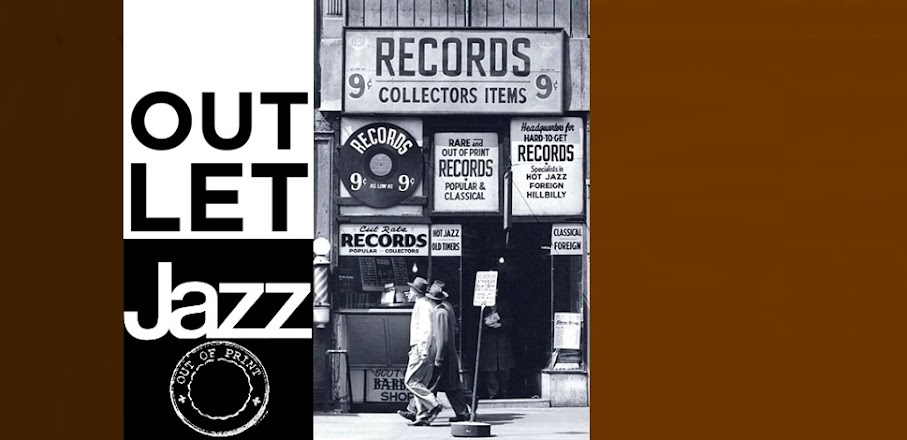When Lennie Tristano's enclosed Capitol recordings were reissued in the mid-eighties, Alun Morgan noted that the music "is still a most remarkable piece of mind-reading and it presaged the Free Form movement which was still several years away".
Leonard Joseph Tristano was born in Chicago, Illinois, on March 19 1919. He began playing piano as a child. At the age of nine, he lost his eyesight and spent the next ten years in a home for the blind. During these years Tristano took up the clarinet, saxophone and also practiced on cello. In addition, he played trumpet and could easily sit in as a drummer.
Lennie Tristano received further musical education at the American Conservatory in Chicago from which he graduated as a Bachelor of Music (in piano and composition) in 1943. From the early forties on Tristano worked as a tenor saxophonist and clarinetist with various bands in his native city. In addition, he taught at the Christiansen School of Popular Music until 1945. Lee Konitz and Bill Russo were among his first and foremost students. The following year Tristano moved to New York where he appeared with a trio including another two of his pupils, Arnold Fishkin and Billy Bauer. In late 1946 Lennie Tristano also played on the West Coast before returning to New York. In 1947 he played in a band organized by critic Barry Ulanov alongside Charlie Parker. During the late forties Tristano mainly worked with his trio in New York but occasionally also played with Charlie Ventura and others. In addition, he continued to teach and a group of young musicians, including Warne Marsh and Ted Brown formed around him. In June 1951 he opened his own music school where Tristano and his circle were able to pratice and play their music, quite independently from any influences of more established institutions. After giving up his school in 1956, he taught disciples at his home on Long Island. After the mid-fifties Tristano only rarely appeared on stage or in clubs. In the late-sixties Tristano made trips to Britain and Canada for a number of solo concerts but then returned to the self-sought seclusion of his home. He died in New York, on November 18, 1978. *Anatol Schenker (liner notes)*
This anthology of Lennie Tristano from his Capitol and Prestige recordings is where the mature composer and improviser appears from his former skeleton. Beginning with the original version of "Dissonance", featuring guitarist Billy Bauer and bassist Arnold Fishkin, the set concentrates on Tristano's emerging and very complex ideas about melodic improvisation. The masters for early tracks here come from a session cut on New Year's Eve in 1947, and include clarinetist John LaPorta on such visionary compositions as "Through These Portals", with its dual melodic front line playing an extrapolated harmonic counterpoint via the piano and guitar, then being bridged by a common third line played by LaPorta, whose solo is almost a tag upon the two entwining solo lines played throughout. "Speculation" is pure chordal genius, with rhythms cascading in two directions against a nearly expressionistic melodic integration of variously shaded harmonics. The first sessions of both the quintet and quartet with Lee Konitz are here, too, with Konitz's unique phrasing on the shimmering bop of "Progression", "Tautology", and, of course, "Subconscious-Lee". Tristano was a giant of the intellect, and his knotty approach to deconstructing harmonics and creating new melodies from the ruins appealed to Konitz, who was, and remains, a melodist. Later that same year, in 1949, Tristano added second saxophonist Warne Marsh to the mix, and that magical pairing found its voice on the front lines of "Crosscurrent", "Intuition", and the stellar "Marionette". Finally, the 1951 trio sides with Roy Haynes and Peter Ind make clear that these new architectures Tristano was building could be erected by himself and a rhythm section, and in some ways were even bigger as a result of that. These ideas have never been fully integrated into the jazz canon as they should be, but nonetheless, with recordings like this abounding now, it cannot be long before they are.
*Thom Jurek*
1 - Dissonance
(Tristano)
2 - Through These Portals
(LaPorta)
3 - Speculation (Ear, Eyes)
(Tristano)
4 - New Sound
(Tristano)
5 - Resemblance
(Tristano)
6 - Tautology
(Konitz)
8 - Retrospection
(Tristano)
9 - Subconscious-Lee
(Konitz)
10 - Judy
(Tristano)
11 - Wow
(Tristano)
12 - Crosscurrent
(Tristano)
13 - Yesterdays
(Tristano)
14 - Marionette
(Bauer)
15 - Sax Of A Kind
(Konitz, Marsh)
16 - Intuition
(Tristano)
17 - Digression (Intuition II)
(Tristano)
18 - Ju-Ju
(Tristano)
19 - Passtime
(Tristano)
#1 to #5:
Lennie Tristano (piano), John LaPorta (clarinet [#2 to #5]), Billy Bauer (guitar), Arnold Fishkin (bass).
Recorded in New York City, December 31, 1947.
#6 to #10:
Lennie Tristano (piano), Lee Konitz (alto sax), Billy Bauer (guitar), Arnold Fishkin (bass), Shelly Manne (drums).
Recorded in New York City, January 11, 1949.
#11, #12:
Lennie Tristano (piano), Lee Konitz (alto sax), Warne Marsh (tenor sax), Billy Bauer (guitar), Arnold Fishkin (bass), Harold Granowsky (drums).
Recorded in New York City, March 4, 1949.
#13:
Lennie Tristano (piano), Billy Bauer (guitar), Arnold Fishkin (bass), Harold Granowsky (drums).
Recorded in New York City, March 14, 1949.
#14 to #17:
Lennie Tristano (piano), Lee Konitz (alto sax), Warne Marsh (tenor sax), Billy Bauer (guitar), Arnold Fishkin (bass), Denzil Best (drums).
Recorded in New York City, May 16, 1949.
#18, #19:
Lennie Tristano (piano), Peter Ind (bass), Roy Haynes (drums).
Recorded in New York City, October 30, 1951.


https://www.mediafire.com/file/smp1e68uclp4diw/LT_clsscs.rar/file
ReplyDeleteThanks a lot!
ReplyDeleteolá
ReplyDeleteit is amazing how a blind man could see so much
thanks a million
joao
Muchas gracias.
ReplyDeleteMuchas gracias.
ReplyDelete